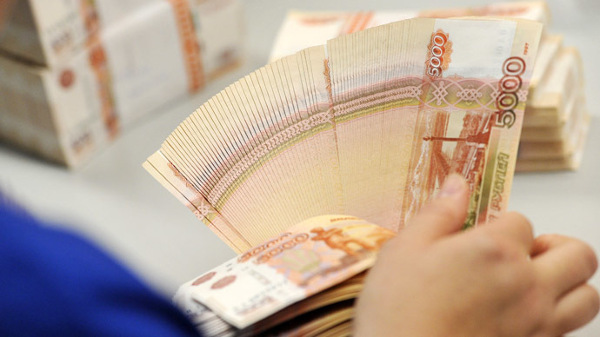Ruble drop resumes as yuan devaluation dents oil, Clouds exports

By Bloomberg
The ruble sank the most in more than a week on speculation China’s decision to devalue the yuan will hurt Russian commodity exports to Asia’s largest economy.
The ruble fell 1.2 percent to 63.5430 as of 12:48 p.m. in Moscow, its sharpest decline on a closing basis since Aug. 3. The retreat almost erased Monday’s rally, the strongest this month. Russia’s five-year ruble bonds rose for a third day, lowering the yield eight basis points before the government announces details of its Wednesday debt auction.
China’s decision to devalue its currency makes raw-material imports more expensive for the world’s biggest consumer of metals and energy. That’s a concern for Russia, where government officials are calling for a so-called pivot east, that would see China take a bigger share of the nation’s exports in response to European Union and U.S. sanctions over Ukraine.
“Russia is in the midst of trying to reduce its dependency on the EU and move more to China for export revenues,” Simon Quijano-Evans, the head of emerging-market research at Commerzbank AG in London, said in an e-mailed note, commenting on the impact of the yuan decision. He reiterated his “cautious position” on Russia’s currency and debt.
Crude oil fell 1.3 percent in London trading to $49.78 a barrel, extending its slump this quarter to 22 percent. Oil and natural gas contribute about 50 percent to Russia’s budget revenue.
‘Sharp’ Gain
“The only thing that really impacts the market is the price of oil,” Vladimir Vedeneev, chief investment officer at Raiffeisen Capital in Moscow, said in e-mailed comments. On top of that, the ruble’s 2 percent jump yesterday was “very sharp,” triggering profit taking by some traders, he said.
Russia may eventually benefit from the yuan devaluation if the move succeeds in reviving growth rates in the world’s second-largest economy, according to MDM Bank PJSC foreign- currency and derivatives trader Aram Kazaryan.
“I think we can benefit from it, but not immediately,” Kazaryan said by e-mail. “If they succeed, the oil price may go higher, pushing the ruble in turn.”
The Micex index of stocks added 0.7 percent, poised for the highest level since May 6, as the ruble’s slide boosted appetite for exporters whose expenses are priced in the local currency, according to Alexander Losev, chief executive officer at Sputnik Asset Management in Moscow.
The Micex trades with a 12-month forward-price-to-earnings ratio of 5.8 compared with 11.2 for MSCI Inc.’s emerging market gauge. The index has climbed 23 percent since the start of the year, compared with a 7.8 percent drop for the developing-nation measure.
“Our stocks are fundamentally cheap,” Losev said by e- mail. “On top of that, the weighting of exporters’ exceeds 65 percent.”
Here we are to serve you with news right now. It does not cost much, but worth your attention.
Choose to support open, independent, quality journalism and subscribe on a monthly basis.
By subscribing to our online newspaper, you can have full digital access to all news, analysis, and much more.
You can also follow AzerNEWS on Twitter @AzerNewsAz or Facebook @AzerNewsNewspaper
Thank you!
